ObamaCare Diagnosed in One Sentence
Quoting Dr. Barbara Bellar:
So, let me get this straight. We’re going to be gifted with a healthcare plan that we’re forced to purchase and fined if we don’t, which purportedly covers at least 10 million more people without adding a single doctor but provides for 16,000 new IRS agents, written by a committee whose chairman says he doesn’t understand it, passed by a Congress that didn’t read it but exempted themselves from it, and signed by a President who smokes, with funding administered by a Treasury chief who didn’t pay his taxes, for which we will be taxed for four years before any benefits take effect, by a government that has already bankrupted Social Security and Medicare, all to be overseen by a Surgeon General who is obese — and finally, financed by a country that’s broke. ... What could possibly go wrong?
Science For Smart People
Tom Naughton recently gave a great presentation called Science For Smart People, and it’s well worth your time. In it, he explains why there seems to be so much contradictory "scientific" evidence nowadays, especially regarding diet and health. Tom also tells how to separate the wheat from the chaff to determine whether an alleged conclusion is actually supported by the evidence in a given study.
In one example, there was a clinical study involving three groups of people: one group on a low-carb, high-fat diet; a second group on a low-fat, moderate-carb diet; and a third group on an unmodified diet. The actual results were that the low-carb group lost more body fat and showed the greatest improvements in all cardiovascular markers, including total cholesterol, triglycerides, HDL and LDL. But what did the researchers write in their conclusion? "Moderate approaches to weight loss such as a moderate-carbohydrate low-fat diet may be prudent." Tom’s take on that:
Quoting Tom Naughton:
By "prudent" I guess they meant "we would like to continue receiving research grants from Kellogg’s, who funded this study."
This shows two big problems with much of the supposedly-scientific information reported on a daily basis: first, that research is often tainted by the simple fact that it’s funded by corporations; and second, that many people, including scientists, find it very difficult to accept the fact that eating fat is not bad for you, because they’ve been brainwashed by decades of government propaganda to the contrary.
How to Watch Internet Video On Your TV (YouTube, Netflix, etc)
I’ve been hearing more and more good things about the Roku box lately. This is an inexpensive little device - between $79 and $129 - that connects to your TV and lets you watch tons of online video from places like Netflix and Amazon Video On Demand. It also supports "channels" that allow people to add support for additional sources, including YouTube, and can display photos from Facebook and Flickr. It even supports lots of smaller indie-type stuff like the TWiT.tv podcasts, and can play your custom Pandora music stations too.
There’s a similar box from Western Digital called the WD TV Live Plus that appears to include many if not all of the same features, plus better handling of your own photos and movies via USB sticks/drives. It’s a little more pricey at $149. But the Roku seems to be quite a well-loved product, whereas I haven’t heard much about this WD device yet.
Much of the online content that you can access through these kinds of devices is free, but that generally does not include feature films and popular TV shows. For that you’d use Amazon’s VOD, which has movie rentals for a couple bucks each; or Netflix, which has a ~17,000-title library of instant-streaming movies and TV shows with unlimited access for as little as $8.99 per month. Of course Netflix is also an amazing DVD-rental-by-mail service, and the $8.99 subscription is actually their entry-level one DVD at a time package; all their packages include the instant-streaming for no extra charge.
The ultimate solution for TV, though, is TiVo. A TiVo costs $299 and is worth every penny. I don’t know how I watched TV before TiVo... actually I do know: I just didn’t bother. The TiVo’s interface for selecting shows to watch/record is by far the best I’ve ever used: there’s no messing with channels or dates or times, you just tell it the name of the show. And its fast-forward (and rewind) implementation is perfect, to the point that trying to use any other devices’s FF/RW (I’m looking at you Boxee, Front Row, etc) is just aggravating. More to the point for this article: through TiVo you can access Netflix, Amazon VOD, and lots of video podcasts like TWiT as well. I’m not sure about Facebook and Flickr, but I have a Mac mini connected to the TV for various other geeky reasons, so I just use that for anything requiring a browser.
There’s also Apple TV and Google TV, but the former has been kind of a dud, is more expensive ($229) and supports neither Netflix nor Amazon VOD (though you can buy/rent content on it via the iTunes Store); the latter isn’t yet available, and seems like it might be a built-into-the-TV feature rather than a separate box you can add to an existing TV. So for the time being, for non-geeky types who don’t want to spend a lot of money, the Roku box looks like a pretty nice solution.
What's a Browser?
Here is an interesting short video of a guy asking people if they know what a browser is, and whether they know the difference between a browser and a search engine. Turns out only 8% of the people knew the difference. The video includes this great quote: "Google predominates the market, obviously."
That number seems shockingly low to me, but at the same time I guess I’m not surprised. A large percentage of otherwise-intelligent people seem to mentally freeze up when the topic of computers arises. Couple that with the fact that people don’t actually need to know what these terms mean in order to use the internet, and the 8% result isn’t so surprising.
Still, I wonder why so many people have this kind of reaction to anything computer-related. I’d say there’s hardly anybody who doesn’t know the difference between, say, their cable TV provider and the various TV channels that they can watch through that provider; yet a similar kind of situation with computer issues totally baffles them. Maybe the internet is still too new for most people to understand it yet.
The video reminds me of this great article from a few weeks ago. It’s about some changes that Facebook was making to their login process, and for a while it apparently was the #1 search result on Google when you searched for "Facebook login". If you scroll down to the comments on the article, you’ll see that there are thousands of them, mostly like these ones:
Quoting confused people:
#5. The new facebook sucks> NOW LET ME IN.
#19. This is such a mess I can’t do a thing on my facebook .The changes you have made are ridiculous,I can’t even login!!!!!I am very upset!!!
#28. OK can I long in now
#31. I am not happy!!!,I was starting to feel comfortable with it now I am all confuse How do I sign in?
#43. Nothing like being taken hostage on our own computer :-(
#47. Why wont you let me sign in?
Apparently a huge number of people get to Facebook -- and presumably all the sites that they visit -- not by typing "facebook.com" into their browser’s address bar, but rather by going to Google and typing "facebook" into it, then clicking on the first search result.
It’d be easy to chalk this up to those people simply being clueless, but I think it also shows that, to whatever extent we IT people have tried to make our products and services user-friendly, there’s still a fundamental disconnect for a large percentage of the population which may indicate that on some level we’ve failed. And ironically this works to Facebook’s advantage, because to many people Facebook is the internet, just as AOL was the internet for many people a decade ago.
Mysterious Dreams
I recently saw an episode of NOVA called What Are Dreams? Dreams are such a fascinating subject, and it was a great show. It’s so interesting for example that scientists have identified 5 stages of sleep, can recognize them based on brain activity and physiological factors, know how long they tend to last and the order in which they occur -- yet the only way to determine whether a subject is dreaming is to wake them up and ask them.
And why do we dream in the first place? One theory is that the brain is running simulations in order to test how our actions affect situations, in order to be better prepared to face potentially dangerous situations in real life. Another says it’s the brain running through newly-acquired information in order to better learn/remember it, or to try and find connections between pieces of information that our waking mind might not realize should be connected.
For the past few years I’ve had variations of the same dream many dozens, if not hundreds, of times. In the dream, I’m in school -- sometimes it’s high school and sometimes it’s college -- and it’s late in the semester. I realize that for one of my classes, I haven’t attended it for most of the semester and haven’t done the assignments and can’t possibly pass it. For the past year or so, however, that recurring dream has been largely replaced with another one: I’m in a situation involving a river or a lake (this is a good and fun dream for me) and I end up jumping or falling into it, then suddenly realizing that I’ve left my iPhone in my pocket.
After watching this NOVA episode, it occurred to me that although I spend the majority of my time alone (except for the cats), I can’t think of a single dream that doesn’t involve other people. And it’s usually lots of other people. It seems that my threat simulator needs to upgrade itself to prepare me for the kinds of threats that I might actually encounter: stubbing my toe on the way to the bathroom, being fangoriously devoured by a small housecat, etc.
The NOW Response to the Tebow Superbowl Ad
Here’s the response from Terry O’Neill, president of the National Organization for Wild Women:
What I saw was a pro-violence-against-women message... The ad connects the idea of male happiness with violating -- committing violence -- against a woman... It’s really a disturbing message when you think about it.
That’s in response to an ad showing a quarterback who pretends to tackle his mom -- while she’s in the middle of talking about him affectionately -- and after which he gets up and gives her a hug. The ad is so sweet it almost makes you gag.
O’Neill’s comment is stupid beyond words. It’s hard to believe that just a few weeks into 2010 we already have such a strong contender for the dumbest statement of the year.
I.O.U.S.A.: The Movie
This movie is downright terrifying. It’s also a must-see. It’s a free instant stream for Netflix subscribers; there’s also a condensed 30-minute version on the movie’s website.
The movie explains the federal deficit, but does so in an interesting way (or maybe I’m just a nerd). Here are just a few of the many great graphs used in the movie:
Federal spending in 2008:
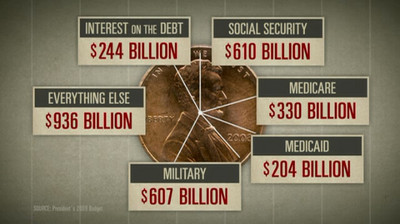
Federal revenue in 2008:
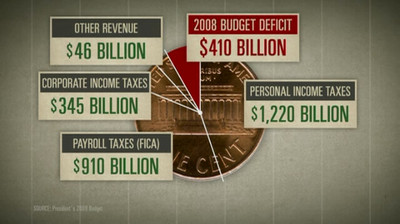
Federal deficit in 2008:
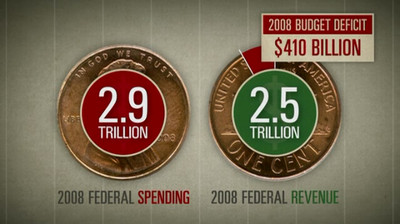
The last 30 years of federal budget deficits (and a few "surpluses"):
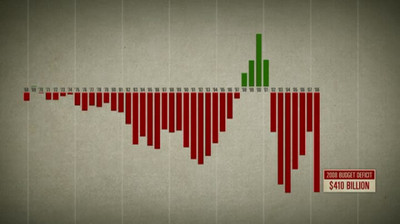
The last 30 years of federal budget deficits, corrected for the fact that we’ve really been taking surpluses from the Social Security fund to pay for ever-increasing federal spending:
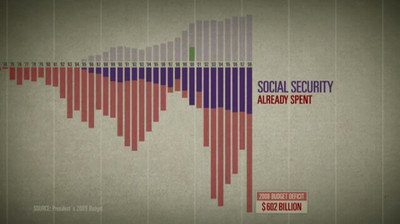
What the next 40 years of deficits will look like, given the policies currently in place, as Social Security goes from surplus to deficit in the next few years:
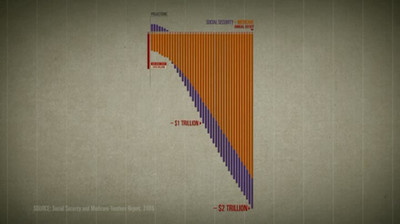
Projected spending in 2030 based on current policies; notice that "military" and "everything else" are statistically insignificant (too small to show up on the graph) compared to the health-care and social security items:
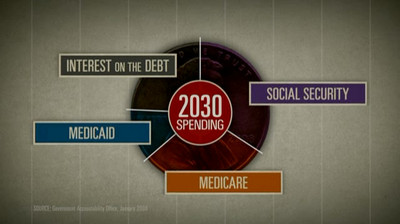
Total unfunded liabilities of $53 trillion as of 2008 (it’s now more than $100 trillion):
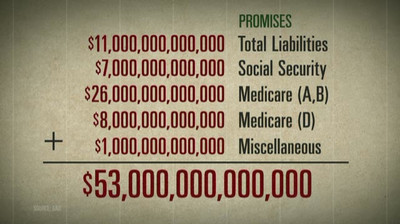
Direct quote from the movie relating to this next item: "Some people think that we can solve our financial problems by stopping fraud, waste, and abuse; or by canceling the Bush tax cuts; or by ending the war in Iraq. The truth is, we could do all 3 of these things and we would not come close to solving our nation’s fiscal challenges."
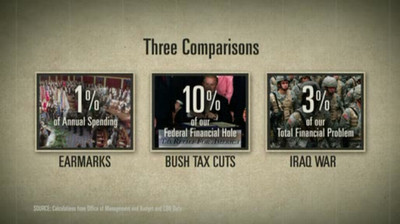
All of which is just another reason (not that we needed another) that this is completely insane:
Quoting The WSJ:
Last year, Mr. Obama made fiscal restraint a constant theme of his presidential campaign. ... However, since taking office Mr. Obama pushed through a $787 billion stimulus, a $33 billion expansion of the child health program known as S-chip, a $410 billion omnibus appropriations spending bill, and an $80 billion car company bailout. He also pushed a $821 billion cap-and-trade bill through the House and is now urging Congress to pass a nearly $1 trillion health-care bill. [...]
When Mr. Obama was sworn into office the federal deficit for this year stood at $422 billion. At the end of October, it stood at $1.42 trillion. The total national debt also soared to $7.5 trillion at the end of last month, up from $6.3 trillion shortly after Inauguration Day.
Google Chrome OS
I love this screen from the What is Google Chrome OS video:
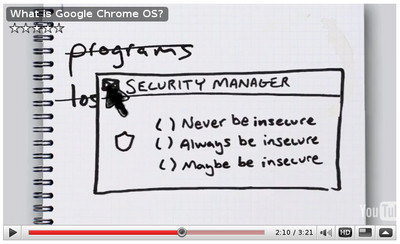
The whole video is interesting and worth watching, too.
TED Talks: the Counterintuitive Psychology of Freedom, Choice, and Happiness; and Invisibility
I watched a few fascinating TED talks recently. In addition to being really interesting, these guys are pretty funny too.
In Dan Gilbert asks, Why are we happy?, he mentions a study on the reported happiness of two different groups of people: the first group is lottery-winners and the second is paraplegics. One year after the event (winning the lottery or becoming paraplegic), the groups report the same level of happiness.
Dan also provides this quote from Adam Smith, the first sentence of which helps to explain that seemingly-wrong study:
Quoting Adam Smith:
The great source of both the misery and disorders of human life, seems to arise from over-rating the difference between one permanent situation and another. Avarice over-rates the difference between poverty and riches: ambition, that between a private and a public station: vain-glory, that between obscurity and extensive reputation. The person under the influence of any of those extravagant passions, is not only miserable in his actual situation, but is often disposed to disturb the peace of society, in order to arrive at that which he so foolishly admires. The slightest observation, however, might satisfy him, that, in all the ordinary situations of human life, a well-disposed mind may be equally calm, equally cheerful, and equally contented. Some of those situations may, no doubt, deserve to be preferred to others: but none of them can deserve to be pursued with that passionate ardour which drives us to violate the rules either of prudence or of justice; or to corrupt the future tranquillity of our minds, either by shame from the remembrance of our own folly, or by remorse from the horror of our own injustice.
In other words, it’s all in your head.
Barry Schwartz on the paradox of choice looks at opportunity cost, and the fact that more choice isn’t always a good thing. He gives the example of jeans: he went to buy a new pair of jeans and was presented with a hundred different varieties, and his response was "I want the kind that used to be the only kind." I can totally see my dad in that situation. When he finally settled on a pair, he got them home and wore them and then was disappointed because they weren’t perfect, whereas in his mind it was easy to imagine that one of the other pairs that he failed to pick would have been perfect -- which is of course false, but nonetheless decreases his satisfaction with the choice he made.
John Lloyd inventories the invisible is less serious and more of a comedy. I love this part:
You cannot remember what happened to you earlier than the age of two or three. Which is great news for psychoanalysts, because otherwise they’d be out of a job, because that’s when all the stuff happens.
He also mentions this quote by W. H. Auden:
We are here on earth to help others. What the others are here for, I’ve no idea.
Windows 7 Launch Party
This can’t be real, can it? Ridiculous doesn’t begin to describe it. It’s actually embarrassing. It’s nearly painful to watch.
Interesting Videos
Here’s a video about whether you should quit your job to become a musician, and in particular about the (un)glamorous life of a touring rock band. It sounds about right from what Andy tells me.
This is apparently the greatest freakout ever. Someone sent it to me a few weeks ago, and then I saw it again last week on The Factor, so you’ve probably already seen it by now. Be warned though, it’s probably as disturbing as it is hilarious.
Finally there’s the most effective alarm clock in the world. I just placed my order.
1000 FPS in Slow Motion
Sweet video here. The hangtime on that jello is amazing.
I would download the 720p or 1080p version, rather than playing it in your browser, to avoid skipping and stuff.
Meet the Command Line
If you’re a Mac or Linux user, and you want to learn about the command line that powers much of your system; or if you’re stuck with Windows but you secretly wish you were a Mac or Linux user who wanted to learn more about the command line; then PeepCode’s new Meet the Command Line video is for you. It looks to be extremely well done and super informative. Check out the 3-minute preview to get a feel for it.
Sweet Vacation Video
Cabel Sasser has a little review of the Canon SD960 point-and-shoot camera, but the best part is the short video he put together. It’s amazing what you can do nowadays with iMovie and a $299 camera -- not even a video camera, just a camera.
Funny Videos
Here’s a few recently uploaded videos: retriever, penguins, and a couple guys in a river.
And here’s a bonus funny kid video from Merlin.
Netflix Ships 2 Billionth Movie
Quoting the Netflix blog:
On April 1 Clay Shannon of Birmingham, Ala. received the two billionth movie, a Blu-ray version of the romantic comedy "Nick and Norah’s Infinite Playlist," and with it, a complimentary lifetime subscription to Netflix.
I called and emailed Clay to tell him the good news and for the longest time he thought it was an April Fool’s prank. Finally convinced, he was elated. [...]
It took eight years for Netflix to reach one billion shipments -- less time than it took McDonald’s to sell one billion hamburgers -- and just over two years to ship the second billion.
We love Netflix. It’s essentially unlimited movies for $18 per month -- the cost of a single trip for two to a crusty movie theater.
It’s not hard to see why Netflix is so successful: they somehow manage to simultaneously be the cheapest and best way to get movies.
They seem to have a great corporate culture, too:
Quoting The Pittsburgh Post-Gazette:
When it comes to vacation, Netflix has a simple policy: Take as much as you’d like. Just make sure your work is done.
Employees at the online movie retailer often leave for three, four, even five weeks at a time and never clock in or out.
Vacation limits and face-time requirements, says Netflix Chief Executive Reed Hastings, are "a relic of the industrial age." [...]
American workers get a median of 10 vacation days after one year on the job and 15 days after five years of work, according to Hewitt. One in three Americans doesn’t use all his vacation, and barely one in 10 takes a break for two weeks straight, according to the nonprofit research firm Families and Work Institute. But at Netflix, it’s estimated that most employees take off about 25 to 30 days per year, using the time to stay at home with the kids, travel to Cambodia or visit relatives in India. It’s "estimated" because Netflix does not record vacation time, said Ms. McCord.
That whole article is worth a read.
Mandles
Somebody uploaded this video to ye olde upload demo today. All I can say is, goodbye golden spice pear and seaside holiday.
Crisis of Credit
Interesting and well-made video explaining the credit crisis. Maybe Tash or Dan can chime in here with some thoughts, since they’re in a business so central to all of this?
The Front Fell Off
Here’s a funny video that someone uploaded. It’s about... politicians. And boats. Or something.
Bonus: an uploaded funny cats video.
Iraqi Reporter Throws Shoes at Bush
The Upside of the Recession
Scott Adams nails it as usual:
It’s expensive to travel anywhere, but on the other hand, the new season of 24 is almost here. I don’t need to go to faraway places and meet people when I can sit on my couch and watch Jack Bauer shoot those people.
The Microsoft / Seinfeld / PC Ads
So apparently I’m in the minority with my opinion of the new Microsoft ad campaign. I think the first and second ads, with Seinfeld, are great, and the third one is totally lame. Everyone else seems to think the opposite.
The Seinfeld ads were ads about nothing, which was of course the whole point of Seinfeld’s TV show. The ads weren’t trying to sell Windows or PCs. They were just Gates and Seinfeld hanging out, trying to be normal guys. The ads were pointless, but they were funny and interesting. And they sure as heck got people talking about Microsoft.
The new "I’m a PC, and I’ve been made into a stereotype" ad is whiny and pathetic. It’s basically saying "please don’t listen to what Apple says about me!" The ad shows lots of politically-correct multicultural images of people around the world saying "I’m a PC", which when you think about it, just means that the PC is pedestrian, in contrast to the Mac, which is special.
The new ad also fails because, technically, every Mac is also a PC. And furthermore, Microsoft doesn’t even sell PCs, they sell Windows, which isn’t mentioned at all in the ad. So what’s the point again?
The Seinfeld ads were bold, new, interesting, and subtle; and they made Bill Gates a little more accessible to us, even if only for pretend. The third ad is utterly unoriginal and boring.
Home – Create Post – Archives – Login – CMS by Encodable
